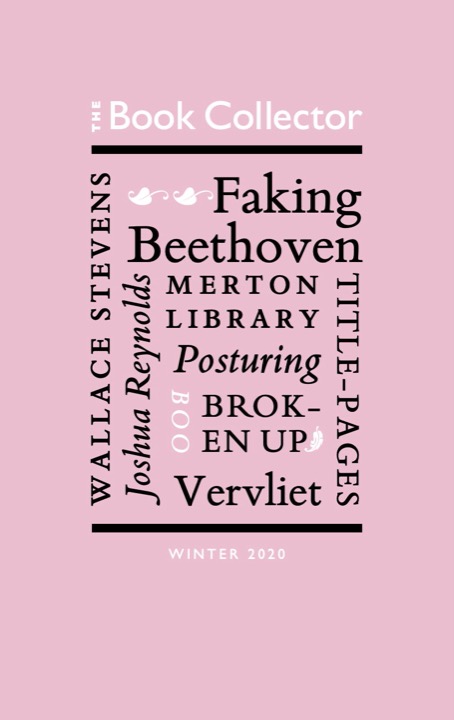Winter 2020 Vol - 69.4

Our leading article, one that called for the most exacting attention, was by Michael Ladenburger, the Beethoven expert who for over thirty years worked at the Beethoven-Haus Bonn. His piece, totally fascinating, was on ‘the different species of Beethoven “fake” that exist.’ There are fakes that are more in the nature of ‘fakesimiles’; there are honest fakes, made for fun or to mock auctioneers, and there are real fakes on which, because the prize for success is so huge, people are prepared to spend untold hours trying to match Beethoven’s ink (possible), paper (difficult) and handwriting (impossible). The author’s attention to detail is mind-boggling. Only one conclusion is straightforward: if you’re minded to fake a composer, go for Berlioz. Next comes Clare Imholtz’s account of finding a rough draft of a poem Lewis Carroll wrote while walking to Beachy Head at 17.75 minutes per mile. (Footnote 7 contains information to be found nowhere else, on the speeds at which various writers have walked and composed.) Publishers are too infrequently considered in the book business; Alan Klein remedies this wonderfully while writing about Wallace Stevens and William Carlos Williams. Then Frans Janssen looks at 16th century title-pages and concludes that it was compositors working on piece rates as rapidly as they could - naturally - that accounts for the oddities of so many title-pages in this period. Mary Wellesley and Tony Edwards take us through the auction history of a group of manuscripts, Claudine van Hensbergen reveals what a poor job Mr Christie did selling Dr Johnson’s library and in a splendid and original article Lauren O’Hagan how, at the end of the 19th century, ‘keeping up with the Jones’s’ was turned, via the bookplate, into a refined form of social posturing. After this, Justin Croft did a lovely review/article on Julia Walworth’s history of Merton College Library and following an appreciation of Hendrik Vervliet, the great historian of typography, we finished with the first of what will be a series of short pieces by Stephen Clarke on the libraries of The Club of Dr Johnson’s era.
Wait, there is more! Hovering in the background is the chance to win 500 pounds sterling (even though they may be worthless by the time of the deadline in January) by describing in 1,000 words an Imaginary Banquet for Bibliophiles. Any period, fictional or real characters. Entry free.
Go for it!
To download your PDF click here:
To search your PDF in Adobe when downloaded, press CTRL/CMD + F and when the box appears type in the word you’re looking for. The pagination that your printer will recognise is given in the bar above the downloaded issue.
